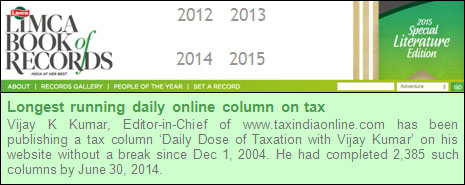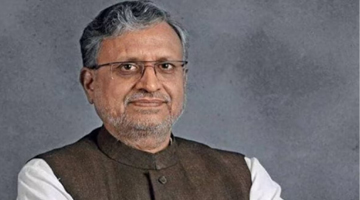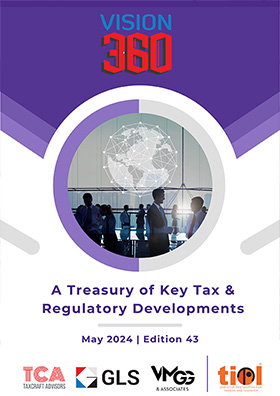
15 10 2015
Thursday
AN extract from DDT 2233 19 11 2013:
Taxing Lottery had been a taxing proposition for the government, not always leading to success. The lottery business in India is a big-time lottery for the organisers and ticket sellers with a turnover of over a lakh of Crores a year.
There is said to be a Lottery Mafia in operation in several States and the whole scheme is full of frauds with absolutely no control. Interestingly the small North Eastern states are the origin for many lotteries and most of the tickets are sold deep down South in Kerala. Technology has only added a new dimension to the fraud. While many states have banned lotteries, Internet knows no geographic boundaries and online lotteries are doing brisk business.
Unfortunately, governments have been interested only in getting their pound of flesh by taxes, instead of curbing the menace, which is simply an organised way of looting the poor people.
Government's attempts to bring sale of lottery tickets under Service Tax net were not really successful. The Department tried to tax it under ‘business auxiliary service' from 01.07.2003, but that did not find favour with the Courts. Then they amended the Act to include an explanation to the definition of ‘business auxiliary service', which the Supreme Court held to be valid only prospectively.
By Finance Act 2010, a new heading zzzzn was introduced which included lottery. This was also struck down by a High Court. Come 2012 and lottery fell in the negative list, but the positive officers of the Department were not prepared to accept such negative attitude of the Government and Parliament. Immediately after the negative list regime came into existence, a Superintendent issued a letter to a lottery seller that he was liable to pay Service Tax.
This letter was challenged in the High Court and the High Court has quashed it emphatically holding that transactions in lottery tickets are not liable to service tax under the provisions of the Finance Act, 1994.
But the Government was determined to tax lottery and again amended the Finance Act, 1994 in 2015.
The memorandum to the Budget 2015 states,
The intention in law has been to levy Service Tax on the services provided by:
(i) chit fund foremen by way of conducting a chit.
(ii) distributors or selling agents of lottery, as appointed or authorized by the organizing state for promoting, marketing, distributing, selling, or assisting the state in any other way for organizing and conducting a lottery.
However, Courts have taken a contrary view in some cases, while in some cases the levy has been upheld. An Explanation is being inserted in the definition of “service” to specifically state the intention of the legislature to levy service tax on activities undertaken by chit fund foremen in relation to chit, and distributors or selling agents of lottery in relation to lotteries.
Even this did not work; The High Court of Sikkim yesterday struck down the provisions imposing Service Tax on lottery. Please see Breaking News.
Please also see:
Also see:
1. Service Tax and Budget - Will it turn out to be a lottery for Lottery Industry
2. Bangalore DGCEI detects service tax evasion of Rs 2263 Cr; recovers Rs 55 Cr last calendar year
3. Dear FM, please tax 'law' and 'lottery'
Why no Service Tax on Lottery?
THE High Court had in an earlier decision held that:
(i) The activity of promotion, marketing, organizing or in any other manner assisting in organising game of chance including lottery being an activity of "betting and gambling" under Entry 62, List II to Seventh Schedule of Constitution of India, the State Legislature alone is competent to levy any tax on such activity under Entry 62.
(ii) The Parliament has the competence and jurisdiction to levy taxes on any subject matter including "service tax" under Entry 97, List I, read with Article 248 of the Constitution of India except where such powers are traceable to any of the entries in List II and III to Seventh Schedule of Constitution of India.
(iii) Power to tax the activity of "betting and gambling" as explained above being within the exclusive domain of State Legislature under Entry 62, List II, the Parliament in exercise of its residuary power under Entry 97, List I to Seventh Schedule of Constitution of India lacks legislative competence to impose any tax including "service tax" on such activity.
The 2015 amendment to the Finance Act 1994 did not change the situation as the High Court observed, we find no change in the circumstance by introduction of the new provisions by the Amendment Act of 2015 from that which existed earlier in Future Gaming Case 2015 (supra) and Future Gaming Case 2014 (supra), we have no hesitation to hold that the finding of this Court in Future Gaming Case 2014 (supra) still continue to hold good. The activity carried out by the Petitioners in relation to promotion of marketing, organising, selling of lottery or facilitating in organising lottery of any kind in any other manner, would clearly not fall within the meaning of 'service' as provided under Clause (44) of Section 65B as the two essential elements (a) that the activity should be carried out by a person for another and (b) that such activity should be for a consideration, are unmistakably lacking.
Lottery in the Constituent Assembly
THERE was an interesting discussion on this subject in the constituent assembly.
Please note these two entries in List-II State List in the Seventh Schedule to the Constitution of India:
34. Betting and gambling.
62. Taxes on luxuries, including taxes on entertainments, amusements, betting and gambling.
So, if lottery comes under Betting and Gambling , only the States can tax it.
In the Constituent Assembly, when this was discussed, Prof. Shibban Lal Saksena said,
“Sir, betting and gambling are being legalised by this entry in the Schedule. I thought that gambling was a crime and so I am surprised to see that gambling and betting are provided for as a legitimate field of activity under this Schedule. In fact, I was sorry that entry No.78 in List I was passed without any opposition,
"Lotteries organised by the Government of India or the Government of any State."
I think that this is against the principles to which we are committed. Gambling and betting should be banned. Sir, I strongly oppose this entry.”
And the following discussion took place:
Shri Lakshminarayan Sahu : Mr. President, I am opposing this for the reason that when we are going to build the entire structure of our State on the foundations of truth and non-violence, when we are guided by the lofty ideals of Mahatma Gandhi, there should be no mention at all of betting and gambling in the Constitution we are to frame. The very mention of these words would indicate that our National Government favours the idea of encouraging betting and gambling and seeks to have its own control on them. Have we forgotten the lessons of the Mahabharat? Taxation on such items does not appear proper. The clause relating to lottery laid down in the Constitution, is also not proper.
Sardar Hukam Singh: Does the honourable Member want that there should be no betting and gambling?
Shri Lakshminarayan Sahu : Yes, I want that
Sardar Hukam Singh : Who is to prohibit it?
Shri Lakshminarayan Sahu: The Constitution Assembly which is making the rules now,should prohibit it. Therefore, Mr. President, I oppose it.
Dr. B. R. Ambedkar : Sir, I am very much afraid that both my friends, Mr.Shibban Lal and Mr. Sahu, have entirely misunderstood the purport of this entry and they are further under a great misapprehension that if this entry was omitted, there would be no betting or gambling in the country at all. I should like to submit to them that if this entry was omitted, there would be absolutely no control of betting and gambling at all, because if entry was there it may either be used for the purpose of permitting betting and gambling or it may be used for the purpose of prohibiting them. If this entry is not there, the provincial governments would be absolutely helpless in the matter.
I hope that they will realise what they are doing. If this entry was omitted, the other consequence would be that this subject will be automatically transferred to List I. The result will be the same, viz. the Central Government may either permit gambling or prohibit gambling. The question therefore that arises is this whether this entry should remain here or should be omitted here and go specifically as a specified item in List I. If my friends are keen that there should be no betting and gambling, then the proper thing would be to introduce an article in the Constitution itself making betting and gambling a crime, not to be tolerated by the State. As it is, it is a preventive thing and the State will have full power to prohibit gambling. I hope that with this explanation they will withdraw their objection to this entry.
Central Excise - Guar Dal Powder classifiable under Heading 1301. No extended period as there were contrary decisions - CESTAT Larger Bench
THIS case came to the Larger Bench of the CESTAT on the directions of the Supreme Court. While excisability and classification as claimed by Revenue were affirmed by the Larger Bench, extended period of limitation was not allowed as the assessee had filed classification list and had specifically mentioned the description of the goods as Guar Dal Powder, with the process of manufacture. And in any event, there were contrary decisions of the co-ordinate Benches of the Tribunal on this issue.
Please see Breaking News.
Scrutiny assessments in cases of assessees engaged in business of Mining- CBDT Instructions
THE assessees engaged in the business of mining are required to file an Annual Return with Indian Bureau of Mines ('IBM')(Form H-1 in case of Iron Ore mining and Form H-2 to H-8 in case of mining in other Ores).
Follow-up enquiries, in regard to some of the companies which find mention in the report of the Justice M.B. Shah Commission of Enquiry, which was constituted by the Government to probe illegal Iron and Manganese Ore mining, shows that in some cases there were significant differences in figures regarding production and closing stock, as reported in the Annual Return filed with IBM vis-a-vis the details furnished in the Income-tax Return.
In this context, CBDT directs the field that while scrutinizing the cases of entities engaged in the business of mining, the Annual Returns filed with IBM by the respective assessees should invariably be obtained and compared with the details submitted to the Income-tax Department so as to ascertain whether any suppression of production and discrepancy in stock exists and further necessary action as per provisions of law may be taken.
CBDT Instruction No. 14/2015, Dated: October 14, 2015
Poor Quality of Data in Electronic Bill of Entry
IN a recent meeting of the Trade Facilitation Committee in JN Customs, the Commissioner informed that poor data quality particularly "description column" while filing electronic Bills of Entry, is one of the reasons hindering increasing facilitation level. He further stated that there are certain details like, Invoice Number, SVB Order No., LC No., Exhibition Goods, COO, C.Ex. Registration No., Brand Name etc are found mentioned in the "description column" of the Bills of Entry, instead of proper description of goods. The incorrect/improper/insufficient description often leads to increased queries resulting in increased dwell time. Therefore, it was emphasised that proper and appropriate description of goods in the Bill of Entry is essential requirement.
In response to the above, the trade replied that there are certain reasons for mentioning these unwanted details in the description column.
1. Sometimes these details are not available on Assessing Officer's Screen. For ease of verification of assessment, these details are entered in the description column.
2. Some Importers insist on the same as the final print of Bill of Entry does not contain these details, however, the importer need these details at various levels like before VAT authorities, C.Ex. etc.
3. Sometimes UQC mentioned in import invoice are not similar as per the Indian Customs Tariff. Since system accepts the Bill of Entry when the UQC is mentioned as per Tariff, for correlation between quantity mentioned in import invoice and final Print of Bill of Entry, details of quantity mentioned in import invoice is being mentioned in the description column, while filing Bill of Entry.
The Commissioner directed that EDI section will examine the feasibility for a specific place, may be in a window on last page of Bill of Entry where these details should be reflected on final printout of the Bill of Entry or in a separate “Remark” column.
Until Tomorrow with more DDT
Have a nice day.
Mail your comments to vijaywrite@tiol.in |









 Download PDF
Download PDF




